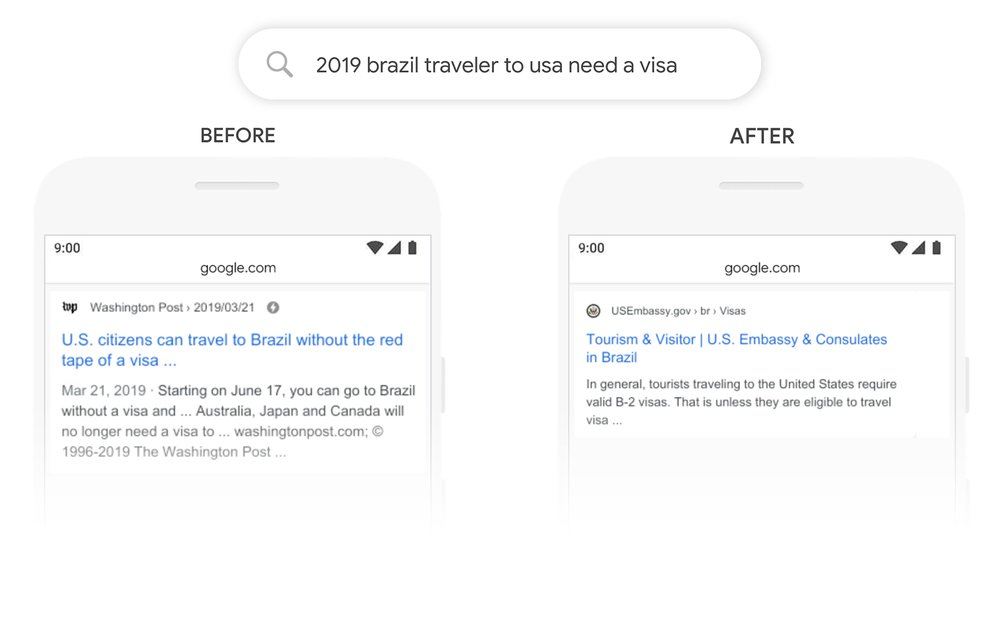Google BERT Update is Here: Should you Tweak your Content Strategy?

BERT is one of the biggest Google updates in recent times
and will directly impact 10% of the
global search queries. Unless you’ve been living under a rock for the past
six months, you might have heard discussions and debates around how to prepare
blogs for this major update.
As content marketers and writers, we are heavily dependent
on search traffic to achieve our engagement goals. As brands and businesses, we
aspire to get ranked higher in search rankings. And as readers, we want
contextual answers to our search queries.
Google has been long thinking about its users and how to improve
search understanding. BERT or the Bidirectional Encoder Representations from
Transformers is a neural network-based technique for NLP.
In simpler terms, Google algorithm is now capable of processing singular words in relation to other words in a sentence. Rather than understanding words in sequence or in order, Google is now smart enough to understand the context of a sentence and the user intent.
BERT: Before &
After

Source: Google
If we look at the example above, Google just came up with a
link to a post that was not at all what user was looking for, before the
introduction of the BERT update. Now it can gauge user’s intent from what
he/she has typed and thus the results are better.
Should You Do Something Right Now to Deal with BERT Update?
If you ask me, I would just say, if you have been working
diligently to post high-quality content with focus on value addition to a
reader’s life, then you need not worry.
But if you are someone who has been shelling out keyword
stuffed content for audiences, this might be the right time to rectify your
strategy!
Often major updates like BERT leads to misconceptions and
rumors among SEO professionals and content marketers. People often start doing
things that’s not even necessary. Google has sticked to its philosophy of
creating user-oriented content:
“This is a major
update. You don’t need to do/change anything. Just keep creating high-quality
content and keep the user in mind.”
So, all you need to do is to stick to the basics of content
marketing. And yes, if you are just starting up, here is my advice to give you
a head start:
Focus on Intent & Make a User-centric Strategy
Till now, you might be comfortably focusing on keywords, but
that will not give you great results from now on. You need to understand a
user’s pulse and intent. Generally, people search for information, navigation
or performing a transaction. If your strategy is dealing with these queries,
you are doing everything right.
An informational query is the hottest SEO opportunity to
rank for a website. For example, if someone is looking for solutions to earn
more money, you can focus on ‘tips to earn wealth’ while creating a content
piece.
For dealing with navigational queries that are quite
specific like ‘earning money by investing in stocks’, you can focus on solution
i.e. stocks.
The end result of a transactional query is often a product
or service. For example, if you are selling a stock market training course,
then here you can directly focus on the specific course-related keywords and
cater to queries about the course.
Till now, BERT has shown an impact on the informational
keywords and queries. So, if you were fishing for the informational
opportunities, you need to be specific with your content. You need to provide
information and guide a user who has been searching specifically for a solution
rather than enlightenment.
What this means for a content creator?
Traditionally, the focus of a content writer is to rank for
informational keywords by creating long-form content and keeping an eye on
keyword density.
But this changes with the BERT update. No longer will Google
rank you just for the length of your blog. BERT now focuses on the quality of
your content over the form.
Also, you need to be sure that your content is extremely
specific and not giving out any generic information. So, rather than writing
about ‘how to earn money in stock market’ your blog should focus on more
specific things like ‘earning money with stocks through technical analysis’
(This is just an example)
The point is to be extremely specific in the approach you
are referring. Though there are no direct implications for this, it is better
to implement this strategy as BERT will get better in understanding user
intent.
Also, you should stop focusing on keyword density and
stuffing keywords for ranking as Google has started understanding the context
of writing.
Don’t beat around the bush
Google will favor those who can provide answers to user
queries quickly. This means you don’t need to just roll around the topic for
filling up a webpage with 1000-word long blog. If you have highly-specific
information around a topic, stick to that and create a blog around it first
rather than providing generic information.
BERT update will gauge the intent of a searcher and if your
page is not appealing to the searcher’s intent, no matter if your information
is detailed, you will fail to rank higher.
It doesn’t matter what medium you are using- text, video,
images, audio or animation, if your content is able to answer and provide the
best experience, you will be rewarded. So, be sharp, stay agile and focus on
long tail keywords instead of long-form content.
Key Takeaways
- Focus on User Intent
- Start Appealing to Specific Queries
- Add Long-tail Keywords in your Strategy
- Ditch Keyword Density Concerns
- Stay committed to quality over quantity, always
Wrapping Up
Google has been giving the same advice for years- create quality content with user intent in mind. Now the intent part is becoming clearer. You don’t need to be BERT-optimized if you already keep users in mind, but if you are still penning down without a target persona, stay cautious as you might lose your traffic soon.
While you're here, check out another blog on how to be more actionable in your content marketing approach.



